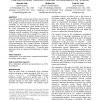Free Online Productivity Tools
i2Speak
i2Symbol
i2OCR
iTex2Img
iWeb2Print
iWeb2Shot
i2Type
iPdf2Split
iPdf2Merge
i2Bopomofo
i2Arabic
i2Style
i2Image
i2PDF
iLatex2Rtf
Sci2ools
100
click to vote
CHI
2008
ACM
2008
ACM
Asynchronous remote medical consultation for Ghana
Computer-mediated communication systems can be used to bridge the gap between doctors in underserved regions with local shortages of medical expertise and medical specialists worldwide. To this end, we describe the design of a prototype remote consultation system intended to provide the social, institutional and infrastructural context for sustained, self-organizing growth of a globally-distributed Ghanaian medical community. The design is grounded in an iterative design process that included two rounds of extended design fieldwork throughout Ghana and draws on three key design principles (social networks as a framework on which to build incentives within a self-organizing network; optional and incremental integration with existing referral mechanisms; and a weakly-connected, distributed architecture that allows for a highly interactive, responsive system despite failures in connectivity). We discuss initial experiences from an ongoing trial deployment in southern Ghana. Author Keywor...
ACM Classification Keywords | CHI 2008 | Ghanaian Medical Community | Human Computer Interaction | Iterative Design Process |
| Added | 30 Nov 2009 |
| Updated | 30 Nov 2009 |
| Type | Conference |
| Year | 2008 |
| Where | CHI |
| Authors | Rowena Luk, Melissa Ho, Paul M. Aoki |
Comments (0)

